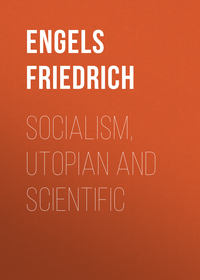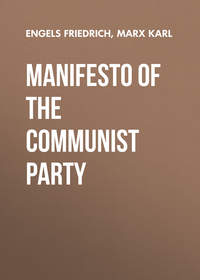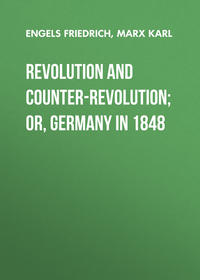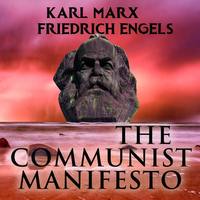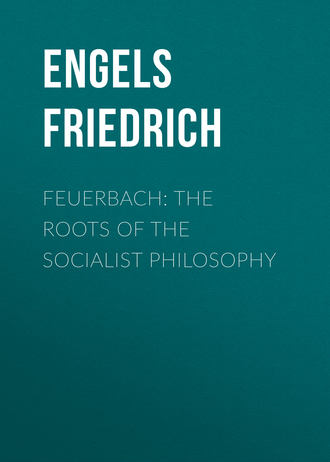 полная версия
полная версияFeuerbach: The roots of the socialist philosophy
But, first of all, there are three great discoveries which have caused our knowledge of the interdependence of the processes of nature to progress by leaps and bounds. In the first place, the discovery of the cell, as the unit, from the multiplication and differentiation of which, the whole of plant and animal substance develop so that not only the growth and development of all higher classes of all higher organisms is recognized as following a universal law, but the very path is shown in the capacity for differentiation in the cell, by which organisms are enabled to change their forms and make thereby a more individual development. Secondly, the metamorphosis of energy which has shown us that all the so-called real forces in inorganic nature, the mechanical forces and their complements, the so-called potential energies, heat, radiation (light, radiating heat), electricity, magnetism, chemical energy, are different forms of universal motion, which pass, under certain conditions, the one into the other, so that in place of those of the one which disappear, a certain number of the other appear, so that the whole movement of nature is reduced to this perpetual process of transformation from one into the other. Finally, the proof first developed logically by Darwin, that the organic products of nature about us, including man, are the result of a long process of evolution, from a few original single cells, and these again, by virtue of chemical processes, have proceeded from protoplasm or white of egg.
Thanks to these three great discoveries and the resultant powerful advance of science, we have now arrived at a point where we can show the connection between changes in nature, not only in specific cases, but also in the relation of the specific cases to the whole and so give a bird's eye view of the interrelation of nature in an approximately scientific form by means of the facts shown by empirical science itself. To furnish this complete picture was formerly the task of the so-called philosophy of nature. It could then only do this by substituting ideal and imaginary hypotheses for the unknown real interconnection, by filling out the missing facts with mind-pictures and by bridging the chasms by empty imaginings. It had many happy thoughts in these transports (of imagination), it anticipated many later discoveries, but it also caused the survival of considerable nonsense up to the present time which could not otherwise have been possible. At present, when the results of the investigation of nature need only be conceived of dialectically, that is in the sense of their mutual interconnection, to arrive at a system of nature sufficient for our time, when the dialectical character of this interconnection forces itself into the metaphysically trained minds of experimental scientists, against their will, today a philosophy of nature is finally disposed of, every attempt at its resurrection would not only be superfluous, it would even be a step backwards.
But what is true of nature, which is hereby recognized as an historical process, is true also of the history of society in all its branches, and of the totality of all sciences which occupy themselves with things human and divine. Here also the philosophy of jurisprudence, of history, of religion, etc., consisted in this, that in place of the true interconnection of events, one originating in the mind of the philosopher was substituted; that history, in its totality as in its parts, was comprehended as the gradual realization of ideas, but, of course, always of the pet idea of the philosopher himself.
History worked up to now, unconsciously but necessarily, towards a certain predetermined, fixed, ideal goal, as for example in the case of Hegel, towards the realization of his Absolute Idea, and the unalterable trend towards this Absolute Idea constituted the inward connection of historic facts. In the place of the real, and up to this time unknown, interrelation, man set a new mysterious destiny, unconscious or gradually coming into consciousness. It was necessary in this case, therefore, just as in the realm of nature, to set aside these artificial interrelations by the discovery of the real, a task which finally culminated in the discovery of the universal laws of progress, which established themselves as the dominating ones in the history of human society.
The history of the growth of society appears, however, in one respect entirely different from that of nature. In nature are to be found as far as we leave the reaction of man upon nature out of sight – mere unconscious blind agents which act one upon another, and in their interplay the universal law realizes itself. From all that happens, whether from the innumerable apparent accidents which appear upon the surface, or from the final results flowing from these accidental occurrences, nothing occurs as a desired conscious end. On the contrary, in the history of society the mere actors are all endowed with consciousness; they are agents imbued with deliberation or passion, men working towards an appointed end; nothing appears without an intentional purpose, without an end desired. But this distinction, important as it is for historical examination, particularly of single epochs and events, can make no difference to the fact that the course of history is governed by inner universal laws. Here also, in spite of the wished for aims of all the separate individuals, accident for the most part is apparent on the surface. That which is willed but rarely happens. In the majority of instances the numerous desired ends cross and interfere with each other, and either these ends are utterly incapable of realization, or the means are ineffectual. So, the innumerable conflicts of individual wills and individual agents in the realm of history reach a conclusion which is on the whole analogous to that in the realm of nature, which is without definite purpose. The ends of the actions are intended, but the results which follow from the actions are not intended, or in so far as they appear to correspond with the end desired, in their final results are quite different from the conclusion wished. Historical events in their entirety therefore appear to be likewise controlled by chance. But even where according to superficial observation, accident plays a part, it is, as a matter of fact, consistently governed by unseen, internal laws, and the only question remaining, therefore, is to discover these laws.
Men make their own history in that each follows his own desired ends independent of results, and the results of these many wills acting in different directions and their manifold effects upon the world constitute history. It depends, therefore, upon what the great majority of individuals intend. The will is determined by passion or reflection, but the levers which passion or reflection immediately apply are of very different kinds. Sometimes it may be external circumstances, sometimes ideal motives, zeal for honor, enthusiasm for truth and justice, personal hate, or even purely individual peculiar ideas of all kinds. But on the one hand, we have seen in history that the results of many individual wills produce effects, for the most part quite other than what is wished – often, in fact, the very opposite – their motives of action, likewise, are only of subordinate significance with regard to the universal result. On the other hand, the question arises: What driving forces stand in turn behind these motives of action; what are the historical causes which transform themselves into motives of action in the brains of the agents?
The old materialism never set this question before itself. Its philosophy of history, as far as it ever had one in particular, is hence essentially pragmatic; it judges everything from the standpoint of the immediate motive; it divides historical agents into good and bad and finds as a whole that the good are defrauded and the bad are victorious, whence it follows that, as far as the old materialism is concerned, there is nothing edifying that can be obtained from a study of history, and for us, that in the realm of history the old materialism is proved to be false, since it fixes active ideal impulses as final causes instead of seeking that which lies behind them, that which is the impulse of these impulses. The lack of logical conclusion does not lie in the fact that ideal impulses are recognized, but in this, that there is no further examination into the more remote causes of their activity. The philosophy of history, on the contrary, particularly as it was treated by Hegel, recognizes that the ostensible and even the real motives of the men who figure in history, are by no means the final causes of historical events, that behind these events stand other moving forces which must be discovered; but it seeks these forces not in history itself, it imports them mostly from the outside, from philosophical ideology, into history. Instead of explaining the history of ancient Greece from its own inner connection, Hegel, for example, explains it solely as if it were nothing but the working out of a beautiful individuality, the realization of art, as such. He says much about the old Greeks that is fine and profound, but this does not prevent our dissatisfaction, now-a-days, with such an explanation, which is mere phraseology.
If, therefore, we set out to discover the impelling forces, which, acknowledged, or unacknowledged, and for the most part unacknowledged, stand behind historical figures, and constitute the true final impulses of history, we cannot consider so much the motives of single individuals, however pre-eminent, as those which set in motion great masses, entire nations, and again, whole classes of people in each nation, and this, too, not in a momentarily flaring and quickly dying flame, but to enduring action culminating in a great historical change. To establish the great impelling forces which play upon the brains of the acting masses and their leaders, the so-called great men, as conscious motives, clear or unclear, directly or ideologically or even in a supernatural form, that is the only method which can place us on the track of the law controlling history as a whole, as well as at particular periods and in individual lands. All that sets men in motion must act upon their minds, but the force which acts upon the brain depends very largely upon circumstances. The workers have by no means become reconciled to the machine power of the capitalists although they no longer break the machines to pieces as they did on the Rhine in 1848.
But while the discovery of these impelling forces of history was entirely impossible in all other periods, on account of the complicated and hidden interrelations with their effects, our present period has so far simplified these relations that the problem can be solved. Since the establishment of the great industry, at least since the peace of Europe in 1815, it has been no longer a secret to anyone in England that the whole political fight has been for supremacy between two classes, the landed aristocracy and the middle-class. In France, with the return of the Bourbons, the same fact was perceived; the writers of history, from Thierry to Guizot, Mignet, and Thiers in particular, pronounce it as a key to an understanding of French history, especially since the Middle Ages. And since 1830 the working class, the proletariat, has been recognized as the third competitor for mastery in both countries. Circumstances had become so simplified that one would have had to close his eyes not to see in the fight of these three classes and in the conflict of their interests, the moving forces of modern history, at least in the two most advanced countries.
But how came these classes into existence? If the great feudal ancient property in land can have its origin ascribed to political causes through forcible seizure of territories, this could not be done as regards the bourgeoisie and the proletariat. There are in this case clearly exposed the origin and progress of two great economic classes from plain and evident economic causes. And it was just as clear that in the fight between the landholding class and the bourgeoisie, no less than in that between the bourgeoisie and the proletariat, economic interests were the most important, and that political force served only as a mere means of furthering these.
The bourgeoisie and the proletariat both arose as results of a change in economic conditions, or, strictly speaking, in methods of production. The transition, first from hand labor, controlled by the gilds, to manufacture and thence from manufacture to the greater industry, with steam and machine force, has developed these two classes. At a certain stage new forces of production were set in motion by the bourgeoisie, following upon the division of labor and the union of many different kinds of labor in one united manufacture, and the methods of exchange and requirements of exchange developed by their means, were incompatible with the existing historical surviving methods of production consecrated by the law, that is to say the gilds and the innumerable personal and other privileges (which for the unprivileged were only so many fetters) of the feudal social organization. The forces of production brought into being by the bourgeoisie rebelled against the methods of production originated by the gildmasters and the feudal landlords; the result is known; the feudal fetters were struck off, in England gradually, in France at one blow; in Germany the process is not yet quite complete. As manufacture came into conflict at a certain stage of progress with feudal methods of production, so has the greater industry now joined battle with the bourgeois organization of industry established in their place. Bound by this system, owing to the narrow limits of the capitalistic methods of production, there occurs on the one hand an ever increasing conversion of the mass of the people into proletarians, and on the other hand an ever increasing amount of products which cannot be disposed of. Over-production, and suffering on the part of the masses, the one the cause of the other, that is the absurd contradiction in which it runs its course, and which of necessity requires a control of the forces of production, through a change in the methods of production.
In modern history, at least, it is therefore proved that all political contests are class contests and that all fights of classes for emancipation, in spite of their necessarily political form (for every class struggle is a political struggle), finally, are directed towards economic emancipation. Here, at least, therefore, the State, the political arrangement is the subordinate, bourgeois society, the rule of economic relations, the deciding element. The old fashioned philosophy which even Hegel respected saw in the State the determining element and in bourgeois society the element determined by it. Appearances corresponded with this idea. As all the impulses of each single agent pass through his individual brain and must transform themselves into motives of his will in order to set him to work, so must also the desires of bourgeois society, no matter which class happens to be dominant, penetrate the will of the state in order to secure universal validity in the form of laws. That is the formal side of the matter which is self evident, the question only is what content has this merely formal will – of the individual as well as of the State – and whence comes this content – why is just this desired and nothing else? And if we enquire into this we discover that in modern history the will of the State, as a whole, is declared through the changing needs of bourgeois society, through the domination of this or that class, in the last instance through the development of the forces of production and the conditions of exchange.
But if in our modern times, with their gigantic methods of production and commerce, the State is not an independent affair with an independent development, but its existence as well as its evolution is to be explained in the last resort from the economic conditions of the life of society, so much the more must the same thing be true of all earlier times when the production of the necessities of existence was not furthered by these extensive aids, where, therefore, the necessities of this production must exercise a greater control over men. If the State is today, at the time of the great industries and steam railways, merely, as a whole, the summarized, reflected form of the economic desires of the class which controls production, it must, therefore, have been still more so at a period when a generation of men must spend the greater portion of their united life-time in the satisfaction of their material needs, and man was, therefore, much more dependent on them than we are today. The examination of the earlier epochs of history, as far as it is earnestly conducted in this direction, establishes this abundantly, but manifestly this cannot here be taken in hand.
If the State and public law are the creatures of economic conditions, so, obviously, is private law, which only sanctions relations between individuals under given normal economic circumstances. The form in which this appears may, however, vary considerably. One can, as happened in England in accordance with the whole national development, retain, for the most part, the forms of the old feudal law, and give them a middle-class content, even read a middle-class meaning into the feudal names, but one may also, as in the western part of the European continent, use as a foundation the first general law of a society producing commodities, the Roman, with its unsurpassably keen elaboration, of all the legal relations of possessions of commodities (sellers and buyers, creditors and debtors, contracts, obligations, etc.), by which we can bring it down as common-law to the use and benefit of a still small bourgeois and half feudal society; or, with the help of pseudo-enlightened and moralizing jurists, a code (which is bad from a legal point of view) can be worked out suitable to the conditions of the particular society (as the Prussian land law). And, still again, after a great bourgeois revolution, a classical code for bourgeois society, such as the French "Code Civil," may be worked out. If, therefore, the bourgeois laws only declare the economic circumstances of society, these may be good or bad according to conditions.
In the State appears the first ideological force over men. Society shapes for itself an organ for the protection of its general interests against attack from the outside or inside. This organ is the force of the State. Hardly did it come into being before this organ dominated society, and as a matter of fact, in proportion as it becomes the organ of a particular class, it brings into existence the supremacy of that class. The fight of the subject against the dominant class becomes of necessity political, a fight in the next place against the political control of this latter class. This consciousness of the connection of the political fight with its underlying economic causes becomes more and more obscure and may be altogether lost. Where this is not altogether the case with the combatants it becomes nearly altogether so with the historians. Of the ancient sources of history with regard to the contest within the Roman Republic, Appian alone gives us plain and clear information respecting its final cause, which was property in land. But the State, once become an independent power over society, forthwith displayed a further ideology. Among the practical politicians and the theorists in jurisprudence, and among the jurists in particular, this fact is first completely lost sight of. Since in each single instance the economic facts must take the form of juristic motives so as to be sanctioned in the form of law, and since, therefore, a backward view must be taken over the whole existing system of law, it follows therefrom that the juristic form appears to be the whole and the economic content nothing at all. Public and private law are considered as independent realms which have their own independent historic evolution, which are considered capable of a systematic representation, and stand in need of it through persistent elimination of all inner contradictions.
Still higher ideological conceptions, i. e., still further removed from the economic foundations, take the form of philosophy and religion. Here, the connection of the ideas with the material conditions of existence become more and more complicated and obscured by reason of the increasing number of links between them, but it exists. As the whole Rennaissance from the middle of the fifteenth century was an actual product of the city, and therefore of the bourgeois domination, so was also the philosophy, since that time newly awakened. Its content was actually only the philosophical expression of the thoughts corresponding with the development of the small and middle bourgeois into the great bourgeois. Among the English and French of the preceding century, who were for the most part as good political economists as they were philosophers, this is quite evident, and we have proofs on its very face, as regards the Hegelian school.
Let us now give a slight glance at religion since it appears to stand furthest away from and to be most foreign to material life. Religion arose at a very remote period of human development, in the savage state, from certain erroneous and barbaric conceptions of men with regard to themselves and the outside world of nature around them. Every ideological notion develops, however, when once it has arisen; it grows by additions to the given idea, and develops it further, otherwise there would be no ideology, that is, no occupation with thoughts as with independent thought-existence, developing independently and subject only to its own laws. That the material conditions of life of the men within whose heads this thought force is at work finally determine the course of this thought-process necessarily remains still unknown to these men, otherwise there would be an entire end of the ideology. These original religious notions, therefore, which are for the most part common to each kindred group of peoples, develop after the separation of the group in a special manner peculiar to each tribe, according to its particular conditions of existence, and this process is for a class of groups of people, and particularly for the Aryans (Indo-Europeans) shown individually by comparative mythology. The gods developed by each tribe were national gods, whose power extended no further than to protect the national territory; beyond the frontier other gods held undisputed sway. They could only be conceived of as existing as long as the nation existed. They fell with its decline. This doctrine of the old nationalities brought about the Roman Empire, whose economic conditions we do not need to examine just now. The old national gods fell, as those of the Romans did also, which were only attached to the narrow limits of the city of Rome. The desire to make the empire a world-empire, by means of a world-wide religion, is clearly shown in the attempts to provide recognition and altars in Rome for all the respectable foreign gods, next to the indigenous ones. But a new world-religion was not to be made in this fashion by imperial decrees. The new world-religion, Christianity, had already arisen in secret by a mixture of combined oriental religions, Jewish theology and popularized Greek philosophy and particularly Stoic philosophy. We must first be at the pains to discover how it originally made its appearance, since its official form as it has come to us is merely that of a State religion, and this end was achieved through the Council of Nice. Enough, the fact that after two hundred and fifty years it was a state religion shows that it was a religion answering to the circumstances of the times. In the Middle Ages it showed itself clearly. In proportion as feudalism developed it grew into a religion corresponding with it, with a hierarchy corresponding to the feudal. And when the rule of the bourgeois came in, it developed into Protestant heresy in antagonism to feudal Catholicism, at first in the South of France, among the Albigenses at the time of the highest growth of the free cities. The Middle Ages had annexed all the surviving forms of ideology, philosophy, politics and jurisprudence, to theology as subordinate parts of theology. It constrained, therefore, all social and political movement to assume a theological form; finally, to the minds of the masses stuffed with religion it was necessary to show their interests in religious guise, in order to raise a tremendous storm. And as the rule of the bourgeois from the beginning brought into being an appendage of propertyless plebeians, with day laborers and servants of all sorts, without any recognized position in their cities, the forerunners of the later proletarians, so the heresy was very early subdivided into a moderate one, on the part of the citizens, and a plebeian revolutionary one, which was an abomination to the bourgeois heretics.


